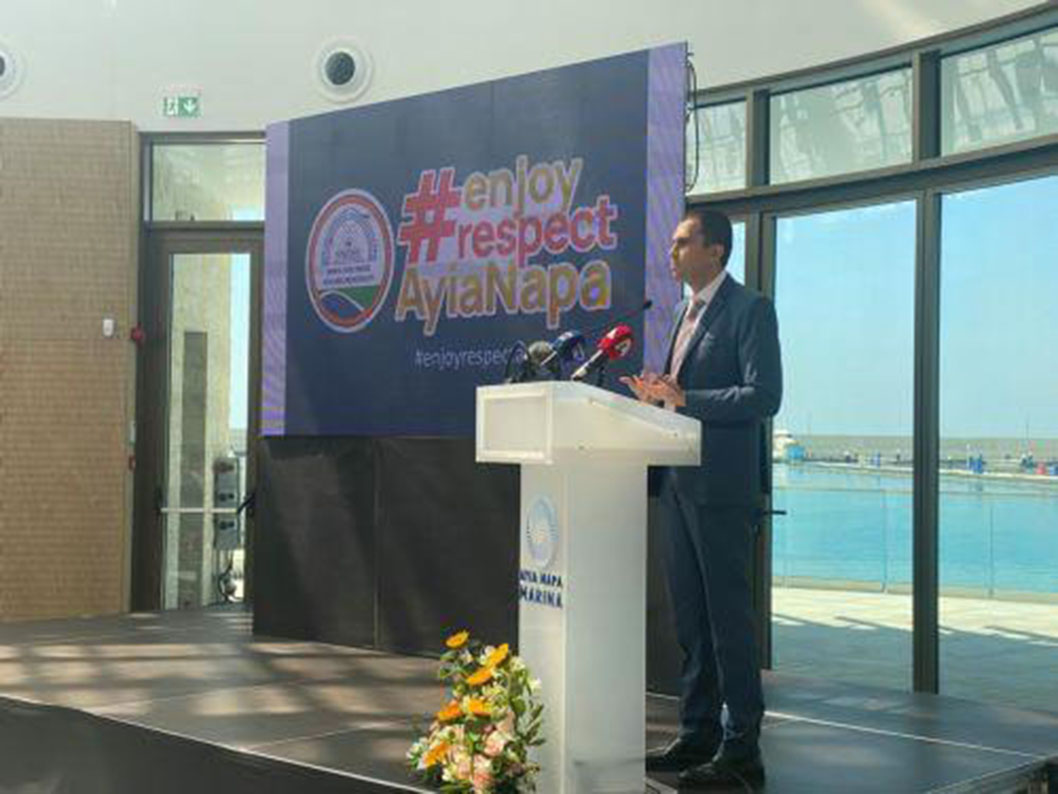Ayia Napa’s municipality on Friday unveiled its new ‘Code of Ethics for Tourism in Ayia Napa’ in an effort to transform the resort into a model, modern, attractive and quality tourist destination.
The #enjoyrespectayianapa campaign was presented by the CEO of RedWolf, Constantinos Daltas, who said that Ayia Napa’s new campaign was based on the digital rebranding of the municipality abroad as a tourism product, with the ‘Always Ayia Napa’ project, launched in 2018.
“The information and awareness campaign will follow Ayia Napa visitors before they travel, by creating a campaign on social media, local media in the target countries and booking sites, distributing information material to agents with what is allowed, what is forbidden and what the visitor can gain from good behaviour and preparing material in the form of a newsletter and in consultation with hoteliers in the area, so that every visitor who books a room for their holiday receives it,” Daltas said.
He added that visitors will come into visual contact with the Enjoy & Respect programme , all the way from the airport to Ayia Napa through the campaign using billboards, while public transport will also carry the message to visitors to Ayia Napa at bus stops and on the outside of buses, with signs at central points of Ayia Napa, beaches and attractions informing visitors about the campaign, while information material and flyers will be available at central points in Ayia Napa, at hotel shops and restaurants.
Deputy Minister of Tourism, Savvas Perdios said that the message that Ayia Napa wants to get across with this campaign, “is also in line with one of the messages we want to give through Cyprus’ new tourism identity and the slogan ‘Love Cyprus’ which is an indirect message to all those who live on the island and to visitors from abroad that we should love and respect Cyprus,” he said.
Perdios said that the tourism ministry could help Ayia Napa municipality’s efforts by reintroducing tourist police during 2023, “which does not necessarily mean that it has to police, but perhaps one of its roles could be to educate and encourage visitors to respect the town, the area and the environment where they are holidaying,” Perdios said.
“There will also be discussions with the finance ministry about the funds that will be needed,” he said, noting that “the issue of tourist police was one of the requests of the Famagusta district, but the coronavirus pandemic prevented its implementation.
Perdios added that the second way that the deputy ministry of tourism can help is to provide the municipalities of the Famagusta district with the information that they need regarding visitors’ comments on the internet.
As he explained, the deputy ministry has purchased services from a digital rating platform for Cyprus as a tourist destination, through which it is possible to monitor the comments that visitors post online about restaurants, bars, beaches and points of interest, receiving a rating for each business.
Meanwhile, the mayor of Ayia Napa, Christos Zannettou said that “through the promotion and implementation of the Ayia Napa Tourism Code of Conduct, the municipality intends to help tourists understand the local rules, raise awareness and at the same time direct them towards adopting responsible behaviour and respect for their fellow human beings, the environment and cultural heritage,” he said.
Concluding, the coordinator of the presentation, Polis Kallis said the purpose of the campaign, he continued, is to ensure the success and reputation of Ayia Napa as a tourist destination, beyond laws and regulations, which in most cases are not easily enforceable.







Click here to change your cookie preferences